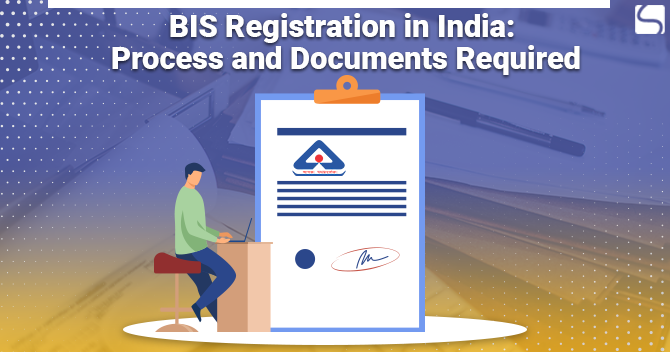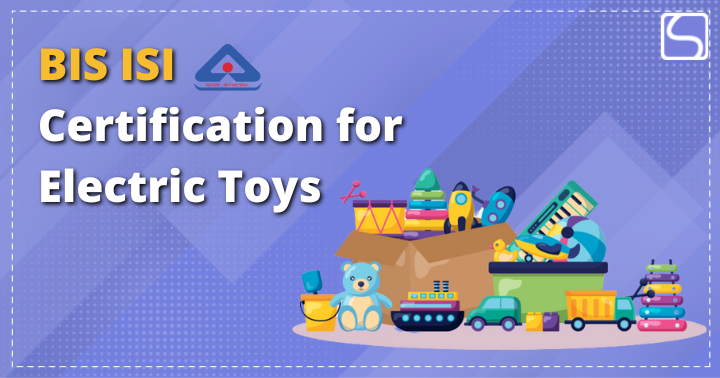BIS Registration in India: Process and Documents Required

Shivani Jain | Updated: Dec 15, 2020 | Category: BIS
Nowadays, it is necessary for almost every product to get the mark of genuineness for authenticating its purity. In the same manner, BIS Registration in India is a way to ensure customers regarding the quality, standards, and purity of a product.
However, it shall be considerate to mention that the products that are significant towards public health and safety need to compulsorily obtain BIS Certification in India.
In this blog, we will discuss the concept, process, and documents required for obtaining BIS Registration in India.
Table of Contents
Concept of BIS
The term BIS or Bureau of Indian Standards denotes a National Standard Body of India that is engaged in the execution and preparation of standards, scheme certification of products, and provides testing and standardization services. Further, this national body comprises 25 members and is headquartered in New Delhi.
Moreover, it has five regional offices located in Kolkata (Eastern), Chennai (Southern), New Delhi (Central), Mumbai (Western), and Chandigarh (Northern).
Objectives of BIS Registration in India
The key objectives of BIS Certification in India are as follows:
- Aims to Protect and Safeguard Citizens Health;
- Offers Quality Assurance;
- Protects consumer from Hazardous Products;
- Boosts Consumer Confidence;
Regulatory Framework for BIS Registration
In India, the BIS or Bureau of Indian Standards Act 1986 works as the regulatory framework for the issuance of the BIS Certificate. Further, it was bought into force on 20.11.1986, and its enforcement has reduced the ambit of the Indian Standards Institution or ISI.
Items Covered Under BIS Registration in India
The items covered under BIS Registration in India are as follows:
Items covered under Scheme 1 or Mark Scheme
The items covered under Scheme 1 or Mark Scheme are as follows:
- Cement;
- Batteries;
- Household Electrical Goods;
- Oil Pressure Stoves;
- Food and Related Products;
- Automobile Accessories;
- Medical Equipment;
- Cylinders, Valves, and Regulators;
- Electrical Motors;
- Steel and Stainless-steel Products;
- Electrical Transformers;
- Chemicals and Fertilizers;
- Capacitors;
Items Termed as IT and Electronic Products
The items termed as IT and Electronic Products are as follows:
- Electronic Games, such as Video Games;
- Microwave, Ovens, and OTGs;
- Laptop, Notebooks, Tablets;
- LCD, Plasma TV, LED Televisions with screen size 32” and above;
- Visual Display Units;
- Optical Disc Players comprising of in-built amplifiers of input power 200W and above;
- Video Monitors with screen-size 32″ and above;
- Wireless Keyboards;
- Printers, Plotters;
- Scanners;
- Amplifiers with an input power 2000W and above;
- Telephone Answering Machines;
Who are all eligible to Obtain BIS Certification?
All the Manufacturers and Producers notified under the CRS or Compulsory Registration Scheme need to apply for BIS Certification in India. However, the things to consider while applying for registration are as follows:
- A Separate Registration Number is required for the products or items manufactured or produced at different locations;
- A Separate Registration Number is required for each brand, product, or item manufactured or produced at the same place;
Documents Needed for BIS Registration in India
The documents needed for BIS Registration in India are as follows:
- PCB Layout;
- Schematic Diagram;
- User Manual;
- Critical Components List;
- A copy of Trademark Registration;
- Factory’s Organizational Chart;
- Legal Address Proof for the Factory;
- List of Machinery Installed;
- List of Equipment Used;
- All the documents concerning AIR (Authorized Indian Representative), when the producer resides in some other country;
- Test Report of the product analysis or examined by the BIS Certified Lab;
- Declaration from the CEO (Chief Executive Officer) of the firm;
- Invoice concerning Sales;
- Packaging List;
- Bills of Lading;
- Insurance Cover Note;
- Certificate declaring the Brand Name of the Owner;
- Letter of Consent (LOC) from the owner of the products;
- Location Map;
- Flow chart showcasing the process of manufacture;
Procedure for Obtaining BIS Certification in India
The steps involved in the procedure for obtaining BIS Certification in India are as follows:
- Firstly, send some product samples or batches for testing in the BIS recognised laboratory;
- After receiving the test report, the applicant requires to enclose some of the basic details as follows:
- Name of the Applicant;
- Name of the Firm;
- Complete Address;
- Signature of the Lab In-charge;
- Now, in the next step, visit the official BIS portal[1] and download form VI and VII;
- However, it shall be considerate to note that while applying for registration, the applicant requires to upload all the required documents and test reports as well;
- Also, he/she requires to furnish a hard copy of the documents and report at the BIS Regional Office;
- In the case of Overseas Manufacturers and Producers, the applicant needs to hire an AIR (All Indian Representative), who will be responsible for obtaining certification on behalf of producers;
- After receiving the application for BIS Registration in India, the competent authorities will conduct examination and scrutiny of all the documents, test reports, and application submitted;
- If satisfied, the authority will issue a Certificate of BIS Registration to the applicant;
The validity of BIS Certification in India
A BIS Registration in India remains valid for a period of 2 years, starting from the date of issuance. That means the applicant requires to renew the license by filing an application in Form XII.
Conclusion
In a nutshell, BIS or Bureau of Indian Standards is a statutory body that is established to provide comprehensive guidelines concerning the quality and safety of products that every manufacturer or producer needs to comply with. Moreover, the Bureau of Indian Standards Act 1986 works as the regulatory framework for the issuance of the BIS Certificate.
However, it shall be considerate to state that there are chances that new firms or entities might face difficulty in obtaining BIS Registration in India. Therefore, it is always advised to consult professionals who are proficient with both the existing quality framework and the latest amendments in BIS Compliance.
At Swarit Advisors, our experts will provide you end-to-end assistance with the matters concerning BIS Registration in India.














